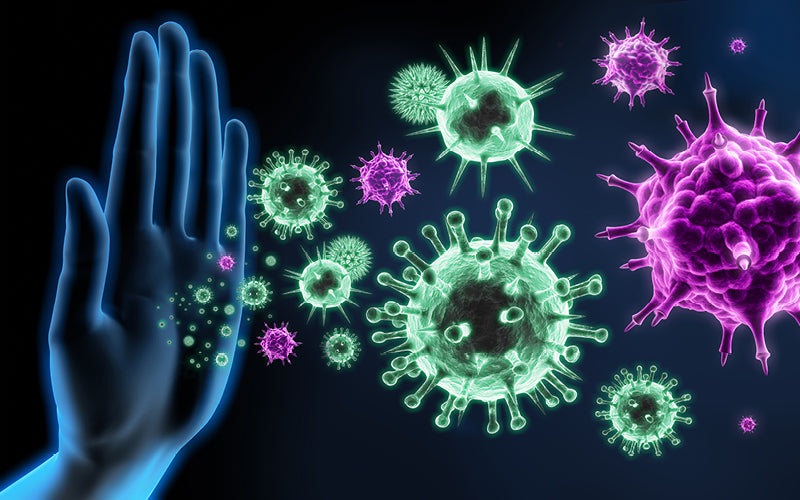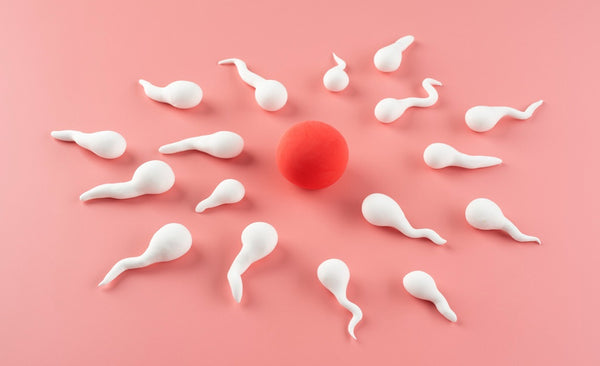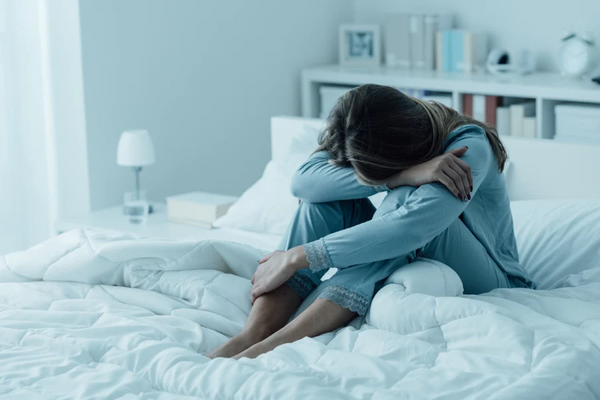Immune Function and Your Menstrual Cycle
Have you ever wondered if your immunity is influenced by your menstrual cycle?
Well, it absolutely is. Your sex hormones; oestrogen, progesterone, and testosterone directly influence your immune response.
Interestingly, this response specifically changes between the different phases of your cycle.
Let’s talk about how and why.

YOUR FOLLICULAR PHASE - the first half of your cycle
The follicular phase encompasses the first day of your menstrual bleed up until the day of ovulation. It is the time in your cycle that oestrogen rises and you tend to be less susceptible to infection.
The reason being is that at this time, women respond by increasing the level of antibodies in their blood. Antibodies are proteins produced and secreted by immune cells. They bind to foreign substances trying to invade the body, such as pathogens.
They also experience an increased inflammatory response during this stage. Now whilst we commonly think of inflammation as a negative reaction, it is, in fact, a vital response to injury and infection. It signals your immune system to heal and repair as well as defend against viruses and bacteria. Which leaves women healthy enough to move into the next stage and ovulate increasing their chances of pregnancy.
This said, the rise in inflammation can be problematic for those who already have chronic inflammatory issues and it’s one of the reasons we recommend Turmeric to ladies who feel poorly prior to ovulation. Happy Dim can also assist in metabolising hormones more efficiently.
YOUR LUTEAL PHASE - the second half of your cycle
The luteal phase of your cycle begins from ovulation up until menstrual bleeding. It is the time in your cycle when oestrogen initially drops and progesterone peaks. At this time, inflammation decreases, and your immune response dampens.
In fact, studies have shown that during ovulation when an egg is released, your immune system weakens to avoid killing off sperm. Essentially the body does what it can in order to ensure implantation and procreation. It’s an innate response by the body to support fertility and further our species!
There is also a link between testosterone and immune cells which play a role in this unique response.
Note that during this stage, the suppression of inflammation which so strongly contrasts the phase before it means that individuals with chronic inflammatory conditions actually feel much better. Healthier individuals, on the other hand, can sometimes feel cold and flu symptoms or a change in their oral health due to the fact they’re more reactive to the presence of plaque and bacteria around the gums.
In women of reproductive age, the phenomenon of the luteal phase appears to be somewhat similar to the well known pregnancy-like inflammatory response.
Hormone drugs
Some evidence suggests that hormone drugs, particularly those which contain synthetic ‘progesterone’ (progestin), can also increase risk of infection amongst ladies due to the suppressed immune response discussed above.
Natural solutions
Whilst the information above explores a natural and normal response by the body that occurs in women of reproductive age, it can help to naturally boost your own immune response during times where you know you may be more exposed to pathogens. In this article, we explore all the aspects of healthy immune function.
For women who have abnormal menstrual cycles, they may find they are more prone to infections in the luteal phase. These women can look at natural options like Happy Hormones which signal to the body to regulate hormone levels to ideal ratios which can offset the potential immune lowering effects.
Taking our online women's health assessment is the first place to start exploring if you have a hormonal imbalance and how to start to take proactive steps to balance your hormones naturally.
REFERENCES
Reed BG, Carr BR. The Normal Menstrual Cycle and the Control of Ovulation. [Updated 2018 Aug 5]. In: Feingold KR, Anawalt B, Boyce A, et al., editors. Endotext [Internet]. South Dartmouth (MA): MDText.com, Inc.; 2000-.
https://www.ncbi.nlm.nih.gov/books/NBK279054/
Oertelt-Prigione S. Immunology and the menstrual cycle. Autoimmun Rev. 2012;11(6-7):A486-A492.
https://doi.org/10.1016/j.autrev.2011.11.023
Abrams, E.T. and Miller, E.M. (2011) The roles of the immune system in Women’s reproduction: Evolutionary constraints and life history trade-offs. Am. J. Phys. Anthropol. 146, 134–154
https://pubmed.ncbi.nlm.nih.gov/22101690/
Critchley HO, Kelly RW, Brenner RM, Baird DT. The endocrinology of menstruation–a role for the immune system. Clinical endocrinology. 2001 Dec 1;55(6):701-10.
https://pubmed.ncbi.nlm.nih.gov/11895208/
Alexandra Alvergne, Vedrana Högqvist Tabor. Is Female Health Cyclical? Evolutionary Perspective on Menstruation (2018) Review, vol 33, issue 6, p399-414.
https://doi.org/10.1016/j.tree.2018.03.006

























